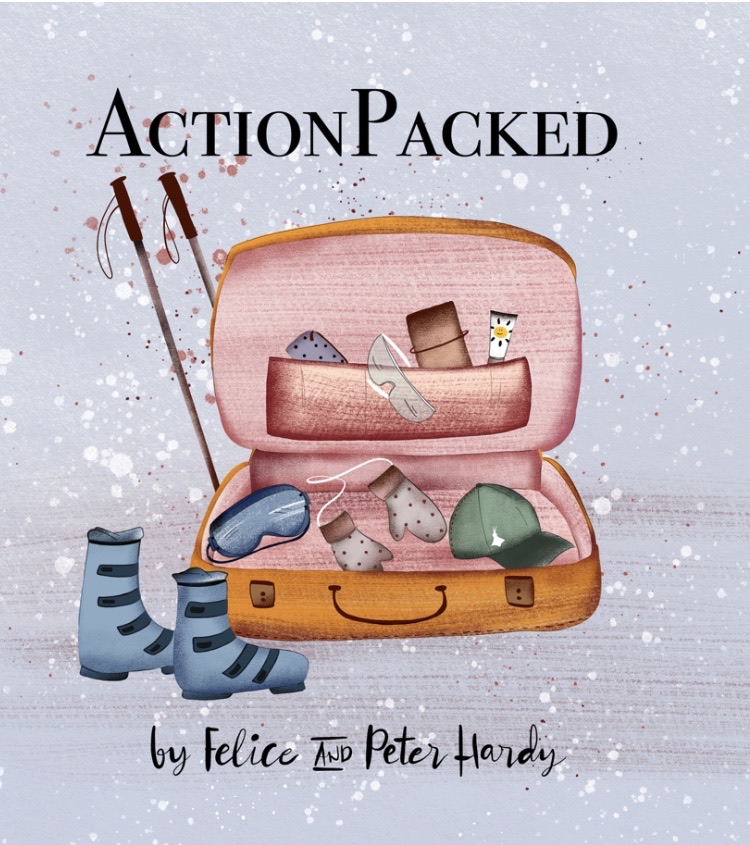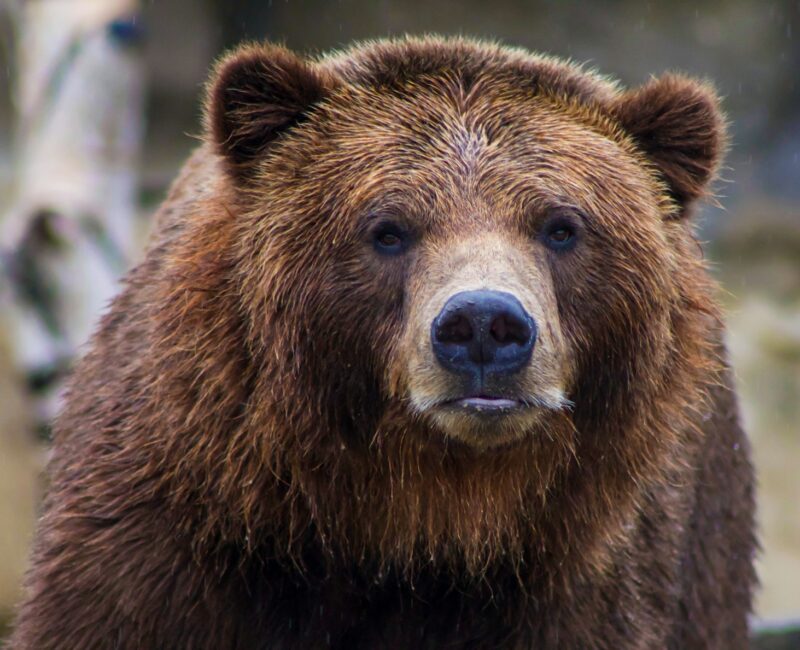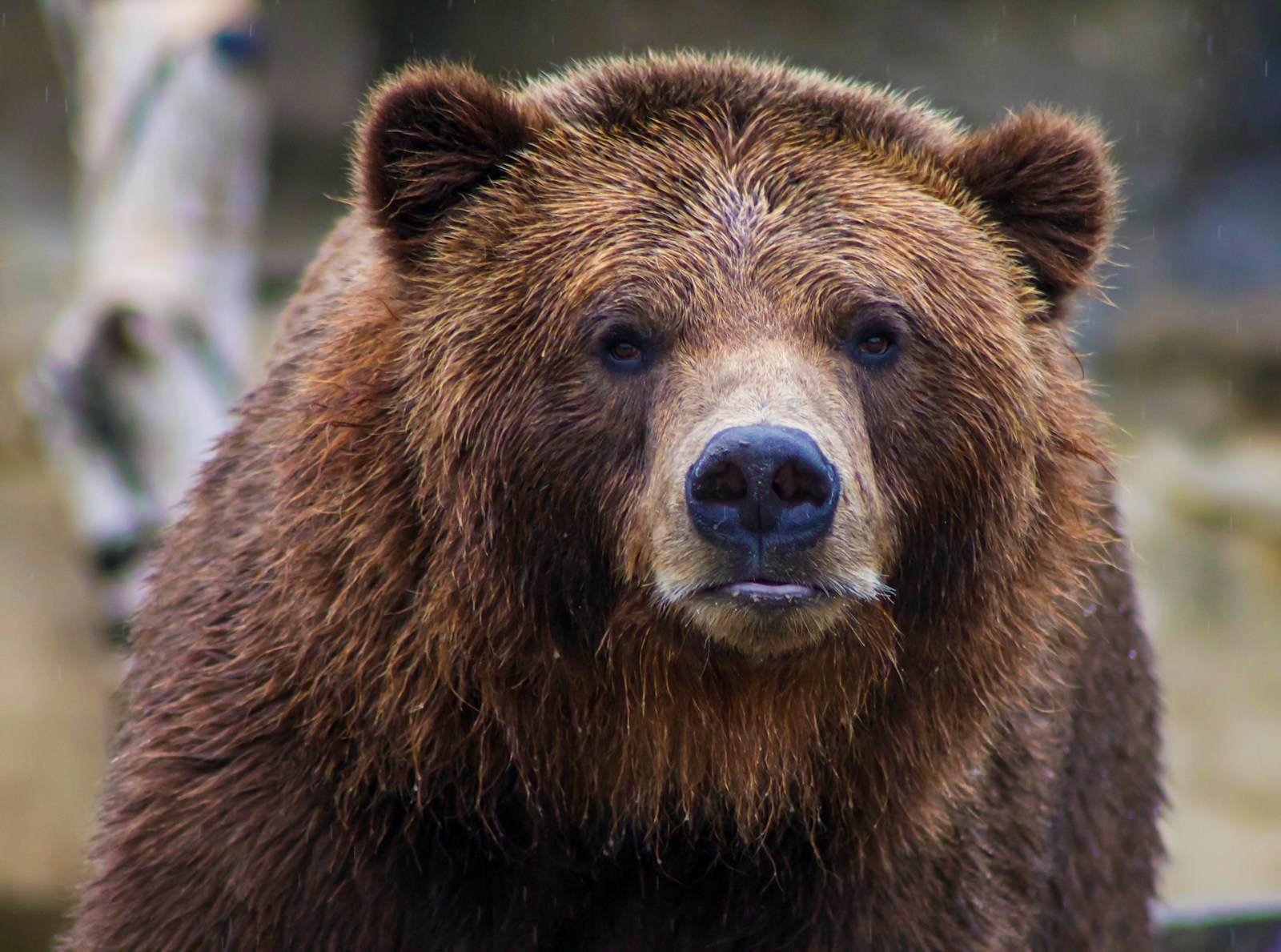
Photo by Becca/Unsplash
Peter Welcome to our travel podcast. We’re specialist travel writers and we’ve spent half a lifetime exploring every corner of the world.
Felice So we want to share with you some of our extraordinary experiences and the amazing people we’ve met along the way.
Peter This week, we’re in France on the frontier with Spain, we’re high in the central Pyrenees, a one-hour drive from Toulouse Airport, and we’re going in search of big and beautiful brown bears.
Penny Walker fell in love with the region that she emigrated from her native Yorkshire and now lives here in a remote hamlet on the French side. She’s absolutely passionate about the mountain range and its furry four-legged inhabitants, along with a host of year-round, action packed adventures. She organises tracking safaris where you might, if you’re lucky, catch a glimpse of these elusive and controversial creatures. Penny, welcome to our podcast. Now tell us, what fascinates you so much about bears in the Pyrenees?
Penny Oh, gosh, yes. I mean, the bears are one of those emotive subjects; it’s a very controversial subject in the Pyrenees. The presence of the bears hasn’t been welcomed by everybody but the bears have been in the Pyrenees since time in memorial; they’ve been there for thousands of years.
And we did have a native Pyrenean bear – unfortunately the last one was shot by a hunter in 2004, which was such a shame because the Slovenian bears that were reintroduced on the reintroduction program in ‘96 – four of them were reintroduced in ‘96 – were intended to help to build the population of brown bears in the Pyrenees and to help sustain the native Pyrenean bears here. Unfortunately, as I say, the last one was shot by a hunter in 2004. So that was a real loss to the community. The Pyrenean bear was extinct.
Peter And so Slovenian bears were introduced. And how many of them are there now?
Penny Well, mainly in the central Pyrenees, we have around 50 brown bears now. The population is expanding. The reintroduction program is continuing. Three brown bears were killed by man last year, unfortunately, and they have to be replaced according to the law. So the authorities are hell bent on preserving the population, growing the population, which is obviously fantastic news for those of us who are passionate about the Pyrenees and the bears that have been here since forever.
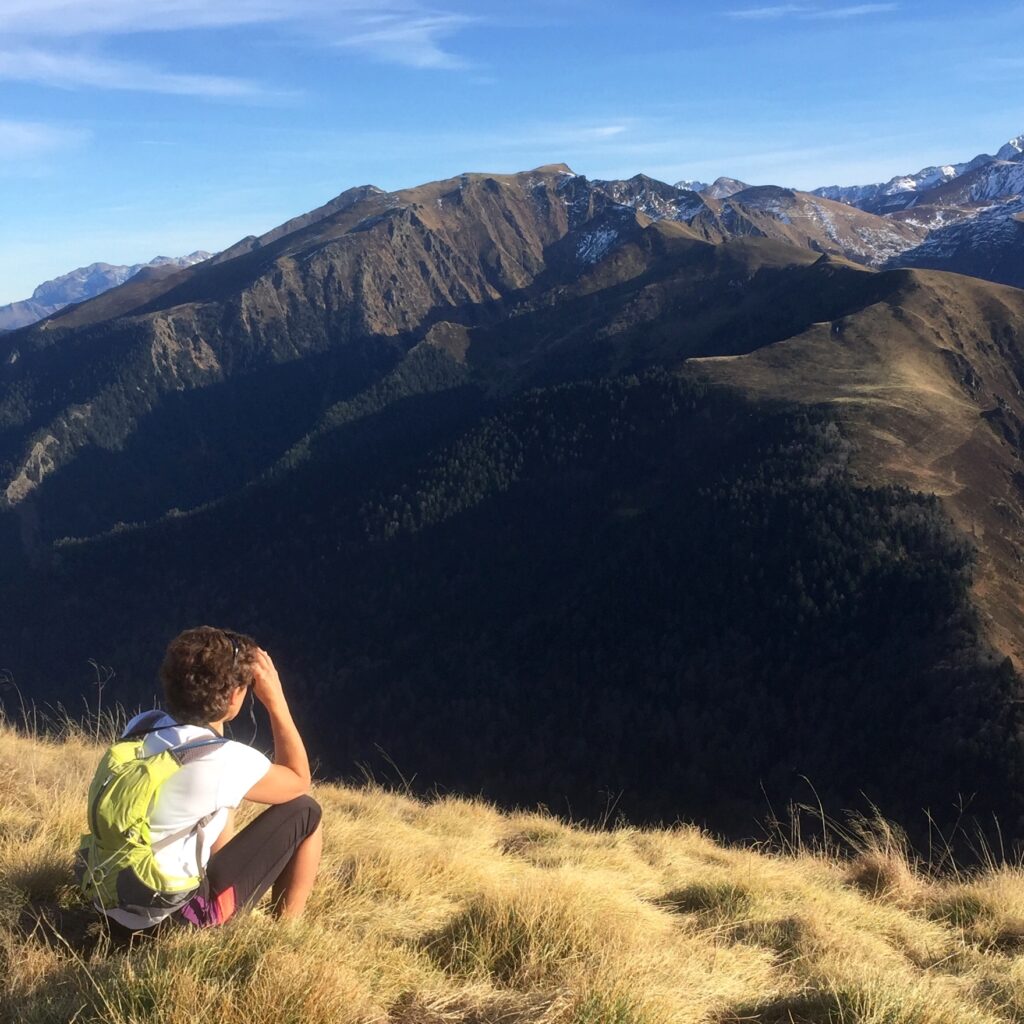
Penny scanning for bears
Peter I’ve actually seen bears in the Pyrenees.
Penny Oh, have you? Whereabouts?
Peter Well, in the Val d’Aran. But I have to add that when they were in a cage, because these were among the first being reintroduced, probably, as you say, in the early 2000s, I can’t remember the exact date. But if you go from Vielha up towards Baqueira on the right near the village of Arties, I think, there was a caged area where they first had the bears. And they’d just arrived. I went there at the end of winter and they were just waking up and they were pretty grumpy looking. I wouldn’t want to meet them in the wild too much.
Penny Well, to be quite honest with you, they’re pretty secretive creatures. They’re much more afraid of you than you are of them; they’re not the grizzly bears that you have in North America. The brown bears are a much milder temperament. They’re generally out and about early in the morning, dusk and at dawn. And they tend to keep themselves to themselves, apart from in mating season in April, May time, and also in the autumn when they’re feeding up for the winter months, that’s when they tend to be seen on the mountainsides a lot more. But at this time of year, they’re generally hibernating and you won’t see them.
Felice So how do you track them if you’re interested in spotting one?
Penny The key is to work with a local expert. Now the Adventure Creators work with a couple of their experts in the area, one on the Spanish side and one on the French side, who know the movements of the bears; they know their habits; they know how they live in the mountains and why they’re likely to be. And they tend to track them using the infrared and motion detection cameras, which are incredibly useful.
A Bear-tracking guide. Photo: © Penny Walker
And they take some of our guests up into the mountains for maybe three or four nights spent under canvas, and you’re up at dawn and obviously watching the bears at dusk as well, and they know exactly where they’re going to be, pretty much. So the best chance that people have got of actually spotting them is with a local guide. It’s the best way.
Felice So we actually spoke to someone about hiking in America and she said bears were a problem there because she was camping outside for months on end and she had to have special bear cans – to put all the food in – that were bear proof.
Penny Yes, I have heard that. Fortunately here, that’s not not really an issue. These bears from Slovenia and their offspring they, as I say, tend to keep themselves to themselves. They tend to stay well away from man. They prefer to just keep themselves under cover as much as possible in the heavily dense woodland and to avoid man, if at all possible. So thankfully, they’re not of the same kind of nature as those North American bears.
Peter So if I want to come bear tracking with you on one of your holidays, tell me what’s involved?
Penny You would arrive in the Aran Valley, generally that’s where the holidays tend to take place: the adventure holidays with the bear tracking. And you’d meet your local guide who would explain to you all about the adventure, what was going to lie ahead of you, and then you’d be taken up to the mountains in a 4×4 and taken to a spot, which would be it would be assessed, based on where the bears are at that time. It would make sure it was downwind of the bear, your scent would not be passed on to the bears, and you would set up camp and scan the hillsides with your binoculars for a sign of the bears out grazing, hopefully in the evening.
The pattern would be repeated over the next two or three days; you’d go with the guide to look for tracks of the bears in the mud, in the woodland below where the campsite would be. And look at the motion detection cameras as well that they have. They take the card out of the camera and they put it into a little tablet and play the card back so you can see what footage has been recorded. And I can tell you, the biggest thrill is seeing that there has been a bear right on that spot where you’re standing. A shiver goes up my back; I’ve seen this twice now, and it’s the most thrilling moment to know that you are standing on the spot where that bear has been.
Peter And presumably you look for scat, bear poo?
Penny Absolutely. I’ve been fortunate enough again, when we’ve been hiking in the mountains, we have a good idea of where the bears are hanging out at any given time. And we’ve been on a couple of hikes in the mountains where we have seen bear poo. I must send you a photo, Peter. We’ve seen this bear poo and the tracks of the mother bear with two young bears – two baby bears alongside, cubs obviously. So, yes, we’ve seen the tracks of the bears, we’ve seen the scat, I’ve collected bear fur off the trees where they’ve been rubbing on these little collecting points that the authorities have placed on certain trees. And, yes, it’s absolutely fantastic to know that you are in the same environment that these bears are inhabiting on a day-to-day basis.
Peter But there is a problem with sheep and farmers, isn’t there?
Penny There is, but there doesn’t have to be. This is one of the big frustrations in the area. The farmers, particularly in the Ariège Department, seem to be hell-bent on getting the bears out of the area. They do not want the bears there, they think are a risk to their sheep. But there are grants available to enable them to protect their flocks.
They can get a Patou guard dog, which is honestly the best deterrent to bears that you can ever possibly have. They will warn the shepherd and ward off the bears if they do so much as approach the sheep in the evenings. They can also get grants for the electric fencing that they can protect their flocks with. But they seem to much prefer the compensation that they get from the government for the loss of sheep that can be attributed to bear attack.
Peter With the emphasis on ‘can be attributed to.’
Penny That’s right. And this is a really emotive subject because, particularly in the Ariège, they put in tremendous amount of claims. We’re talking about thousands of claims for sheep that have been killed by the bears. The majority of those are awarded, even though in actual fact those sheep were probably not killed by the bears.

Bears are omnivores, they prefer not to go out and kill. They prefer to graze off the berries and the shoots that are found on the hillsides, and the bilberries in the autumn. It’s only if they’re really desperate that they would normally kill. So, yes, the farmers and the pastoral communities, particularly in the Ariège Department are pretty radical. And even some of the people in authority higher up in the area, the conseil general, and they seem to be very anti-bear as well. And they’re supporting the farmers who are against having the bears in the area.
Felice So, Penny, when did you first go to the Pyrenees?
Penny That was back in 2006 was the first time I actually visited the Pyrenees. It was just for a holiday, basically to explore. And we went skiing up in Andorra, which was really quite beautiful. But we’d always wanted to live in a mountain environment. We obviously knew of the Alps – we’d been to the Alps like everybody does, let’s face it – but it was always too populated. There were too many tourists, too many people around. It wasn’t the environment, the community that we were looking for. Plus of course, house prices in the Alps are so expensive.
So we started exploring the Pyrenees back in 2006, 2007, and we very quickly realised this was the environment, this was the landscape we wanted to be in. This was where we wanted to be. And we haven’t looked back, Peter, it’s just the most incredible place to to live, to adventure, to explore, to enjoy food. Yes, it’s a great area.
Felice So where did you live before you went there?
Penny Sheffield. It is totally different and I’m sure you can you can detect the slight Sheffield twang that I can’t get rid of. But yes, we lived in Sheffield and explored the Peak District a lot while we were up there, obviously: hiking, climbing, fell running. It was a beautiful area, but obviously Sheffield is not the Pyrenees, as you say, very different.
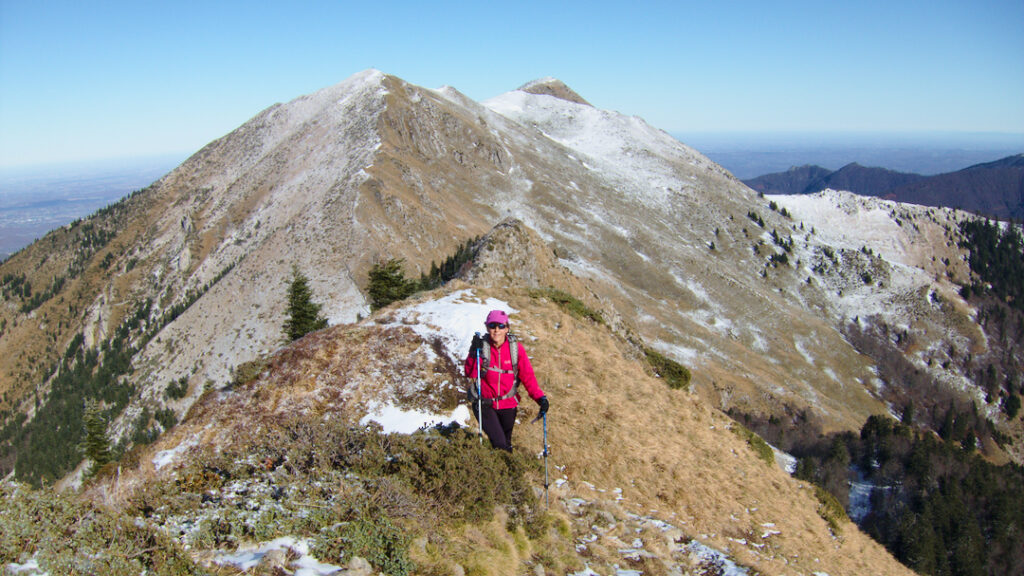
Local hiking. Photo: © Penny Walker
Felice So whereabouts exactly do you live in the Pyrenees?
Penny We’re right in a tiny little hamlet at the head of a tiny little valley right in the centre of the Pyrenees. It’s pretty much equidistant between the Mediterranean and the Atlantic. It’s about two and a half hours to each. So we’re in a tiny little hamlet, really rural community. We’ve got the mountains 25 minutes in one direction, and we’ve got the plane and the autoroute that goes up Toulouse 15 minutes in the other direction. So we’re perfectly placed to really make the most of this part of France.
Felice It sounds perfect. I’m really jealous!
Penny And I should say, Felice, the weather is absolutely perfect most of the time as well. We’ve got the good mixture of the Atlantic weather systems and the Mediterranean weather systems. So it’s not too wet, it’s not too hot, not too cold. And the big thing about the Pyrenees, I find, is that the two sides – the Spanish and the French sides – are completely different. You go through the the Baqueira tunnel to the other side, and it’s you’ve got you’ve got a landscape of gorges, limestone gorges, big dramatic scenery, much, much drier than here on the French side, where it’s lush, jungle-esque in parts, I find. And it’s the contrast.
I go into Spain and I feel like I’m going on holiday and it’s literally just up the road, you know. So we’re in a good place in the central Pyrenees and I think that’s what a lot of visitors do appreciate as well – the climate is really exceptional. And as I say, we’ve got Spain literally just across the border, just along the valley, where again you can have a completely different weather system. It could be perfectly sunny on that side and then on this side, we’ve maybe got a lot more cloud. You don’t have to travel far to get good weather.
Felice So what other things can people do if they’re staying with you in the Pyrenees?
Penny Oh there are so many wonderful experiences here in the Pyrenees. The majority of our adventures are action-based; they are based in the mountains. People can go rafting, they can go river canyoning, which is an exciting sport if you’re into the water and you love the thrill of adventure, the adrenaline of jumping into deep pools off these big waterfalls. People can go horse riding, they can go rock climbing, via ferrata.
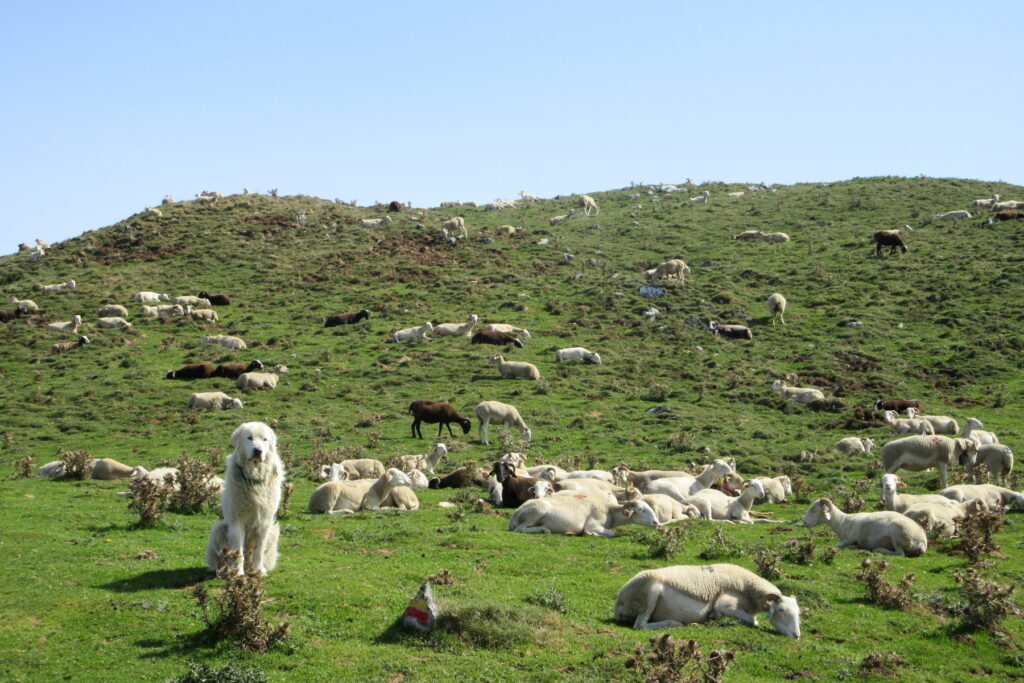
Patou dog and sheep. Photo: © Penny Walker
But my personal favourite, the activities that I propose, wherever I possibly can, is the pastoral activities where people can really experience the heart of the Pyrenees, life in the Pyrenees. They can visit the shepherd up in the mountain pastures surrounded by his flock to find out about his life there. What does it mean to be a shepherd in the Pyrenees in these days? How do they handle the threat of the bears? How efficient are the guard dogs? Being immersed in the pastoral environment, with a person who spends the majority of their summer up there, is a really special thing.
And the other thing that I encourage people to do is to discover the gastronomy of the Pyrenees, the food which is truly exceptional here. I could talk about cheese until the cows come home – or the sheep in my case, because I much prefer the sheep’s milk cheese. We do enable people to visit the local sheep farms where they can see the sheep being milked, they can taste the cheeses that are produced. They can learn about the whole raising of the animals as the Pyrenees subject, which children in particular are absolutely captivated by.
Peter And I have to share that a lot of people don’t realise how well you can eat in the Pyrenees on both sides of the frontier.
Penny Well, that’s the beauty of it on both sides. You can you could be having tapas for lunch in Spain and then pop back to France and have crêpes for your afternoon snack. You know, we have two gastronomies for the price of one, but certainly the cheese, the charcuterie are exceptional. We have the black noir de bigorre pigs that are raised in our area, which produce the most delicious jambon – the hams, cured hams – that you could possibly imagine.
We have master chocolate makers as well, for those who have a sweet tooth. I can arrange for people to visit the chocolate maker and see him up actually making the chocolate in his laboratoire, as they call it, in his workshop. And then obviously there’s all the tastings that go with it.
Peter And some quite serious local wines, again on both sides of the frontier.
Penny Oh, totally. Yes. I mean, the Ariège in particular, there are some wonderful little vineyards in the Ariège, which I think a lot of people find quite surprising. They have no idea that wine is actually produced in the Pyrenees. And then obviously further west, you have the Jurançon vineyards near Pau, which produce a whole range of wines, not just your dessert wines a lot of people know Jurançon for, but some lovely dry wines, even rosé Jurançon wines are produced there. And then a little bit further north, you have the St-Mont vineyards and also Madiran. Yes, it’s a fantastic area if you are into your wines and even beers.
Now that we have mentioned the beers, the artisanal breweries in this area of the Pyrenees, are truly incredible. If you want a change from your wine, I can highly recommend a little tiny microbrewery that’s based up in Luchon called the Brewery de Venasque. And they again produce blonde beers; they produce darker beers. The base product is the water, the spring water, spa water that comes out naturally from deep wells in the ground that has a particular mineral quality about it. And that makes really quite a different tasting beer to any that you’ll find anywhere else.
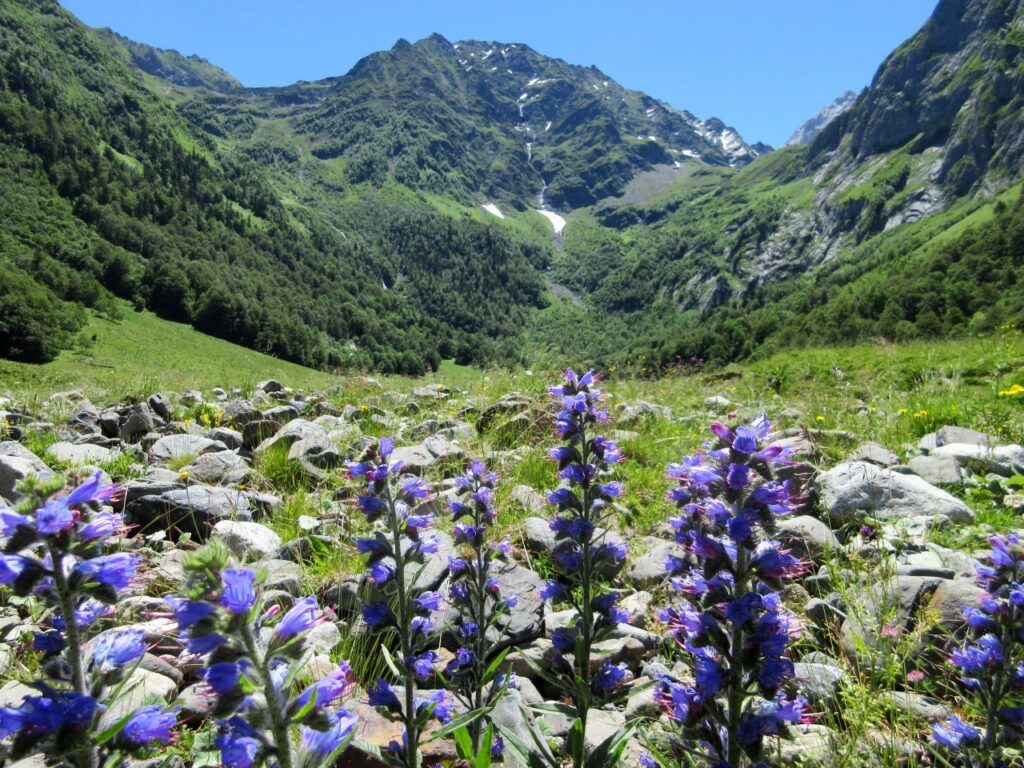
Spring flowers.Photo: © Penny Walker
Peter So what kind of temperature do you normally get in the Pyrenees…in summer, first of all?
Penny Well, that is a very hard question to answer, because with climate change we are seeing some quite interesting weather phenomenon at the moment. Generally speaking, in July and August, temperatures could get up to the mid to high 30s. But obviously in the mountains, it’s much cooler. It’s a wonderful environment in the summer, if you can get over sort of 1500 metres. It’s generally very dry. But again, we are having these exceptional weather circumstances where we’ll suddenly get enormous storms that have come out of nowhere.
The winter is very variable at the moment. We would normally have fairly equal temperatures in winter and moderate snowfall. But the patterns over the past few years have been really strange. Again, thanks to climate change. This winter, we had exceptional snow in November as well as December and January. But now in February, when you’d expect it’s been midwinter, we’ve got 20 degrees.
Peter That’s extraordinary.
Penny It is absolutely extraordinary. So there is no real pattern to the weather here, nor is there in probably any other part of Europe at the moment.
Peter So you feel at the moment that spring has come early?
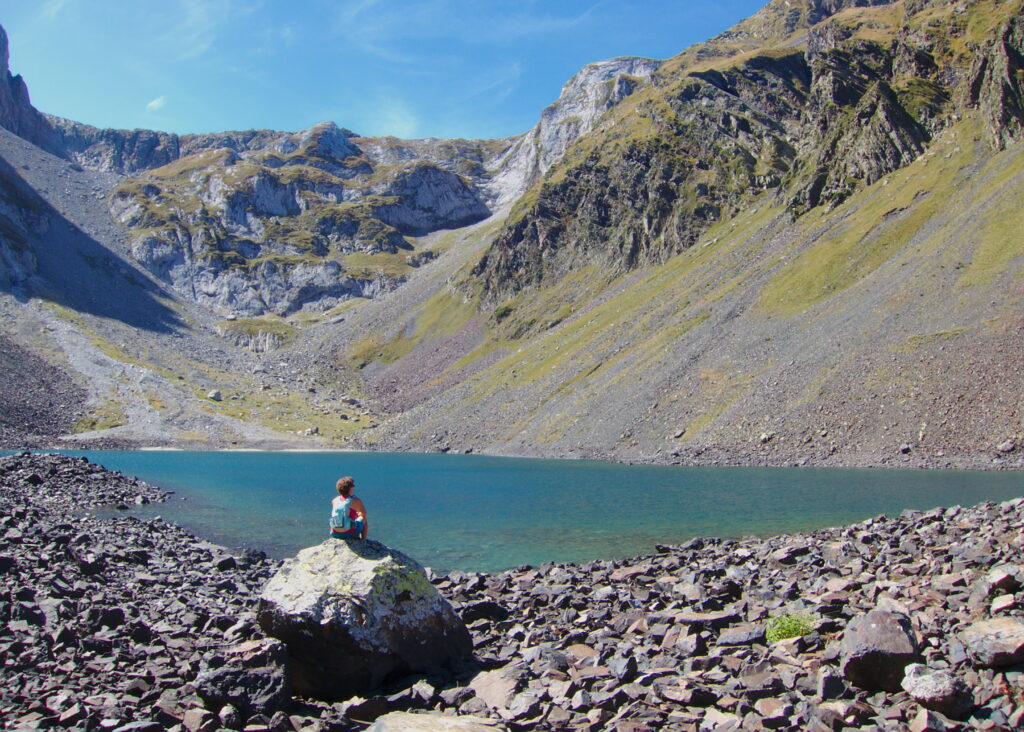
Local scenery. Photo: © Penny Walker
Penny Totally, yes. All the trees are coming into bud. The fruit trees are budding up, the catkins are out. I’m just hoping we don’t have a really cold, chilly snap coming up, which will obviously kill a lot of the buds that are erupting on the trees at the moment.
Felice So what sort of sports can people do around you? Can they go cycling and skiing?
Penny You can do both. I mean, that’s one of the beauties, I think, of the Pyrenees at this time of year when the weather is unpredictable and you can’t guarantee the snow. There’s so much more that you can do. As you say, cycling is a big sport here, and it’s not all about the big cols, the big Pyrenean col that you see on the Tour de France.
The cycling in the foothills is just beautiful, cycling on quiet country lanes through tiny little villages, stopping for a café creme occasionally at a little cafe that might be open along the way. And also there are green ways that families can cycle with younger children. We can arrange bike hire where children can cycle on very calm, quiet, barely frequented little lanes. And that’s a beautiful experience for families, particularly in the summer months.
Peter And off-road mountain biking as well?
Penny There’s a tremendous amount of off-road mountain biking here, Peter. The Enduro World Series, we have one of the stages that’s taking place in our area of the Pyrenees in September. And this part of the Pyrenees is becoming known as a mountain biking mecca with tremendous number of world class routes opening up – single track options. There’s plenty of place for people who want the extra help rather than having to pedal up the hills. Obviously, the mountain biking is truly exceptional and it’s a little-known destination for mountain biking as, again, most people go to the Alps.
Peter And e-biking as well?
Penny E-bikes are a big, big up-and-coming business here, absolutely. And I think that’s particularly the case for people who’d very much like to tackle the cols that are featured on the Tour de France every year, but don’t have the legs for it. And I have to say, I class myself in that category these days. I used to love cycling the cols on my road bike, but the old legs are deciding that it’s maybe time to stop that malarkey.
Peter We’re definitely e-bikers ourselves.
Penny Oh, fantastic. Now the e-bikes, you can you can hire e-bikes for road cycling, you can hire bikes for mountain biking. It’s definitely an up-and-coming big sport in the Pyrenees and there are opportunities for everybody.
Felice And what about skiing? Where are your nearest places to do that?
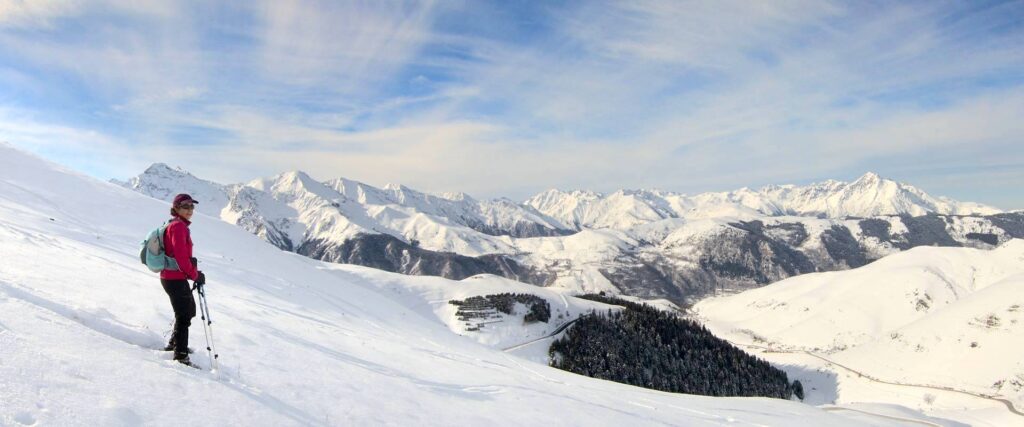
Skiing in the Pyrenees. Photo: © Penny Walker
Penny We’ve got a lovely little ski resort that’s literally 20 minutes up the road from us here called La Mourtis. And it’s quite low altitude, so it does depend on the snow conditions, which are quite variable at the moment. But when it’s snowy up there, the pistes are absolutely beautiful. It’s a gorgeous setting with pine woodland and easy slopes for children and a couple of slightly harder ones for the adults. But the bigger resort is Peyragudes which is up above Luchon.
There’s great variety of ski slopes up there, but there are also plenty of opportunities for people who don’t ski. And again, I trust myself in that category. I’m one of those that’s got all the gear and no idea. And I would love to learn to ski properly and get myself some lessons to be more confident on skis. But in the meantime, I enjoy the snow-shoeing up in the mountains and also going out with the huskies in the winter. That’s a great experience, not just for the kids, but for adults and individuals as well.
Felice We’ve done that in the Alps and also in Canada.
Penny Isn’t it wonderful? I mean, we’re really lucky to have a chap here who breeds the huskies who used to be a vet, actually, who is absolutely passionate about the animals. And when we arrange a husky experience, people will meet the dogs. They’ll learn about the different breeds of husky, about their pack life, about their diet, about every aspect of husky life. And then they can go out with them for a walk attached to one of these harnesses that can take them on a training walk up onto a high point with a beautiful mountain views. It’s a really different experience, I think, for people who enjoy the mountains and want to learn about a dog that they traditionally only associate with winter.
Peter So can I come and holiday with you and do a variety of different activities inside a week?
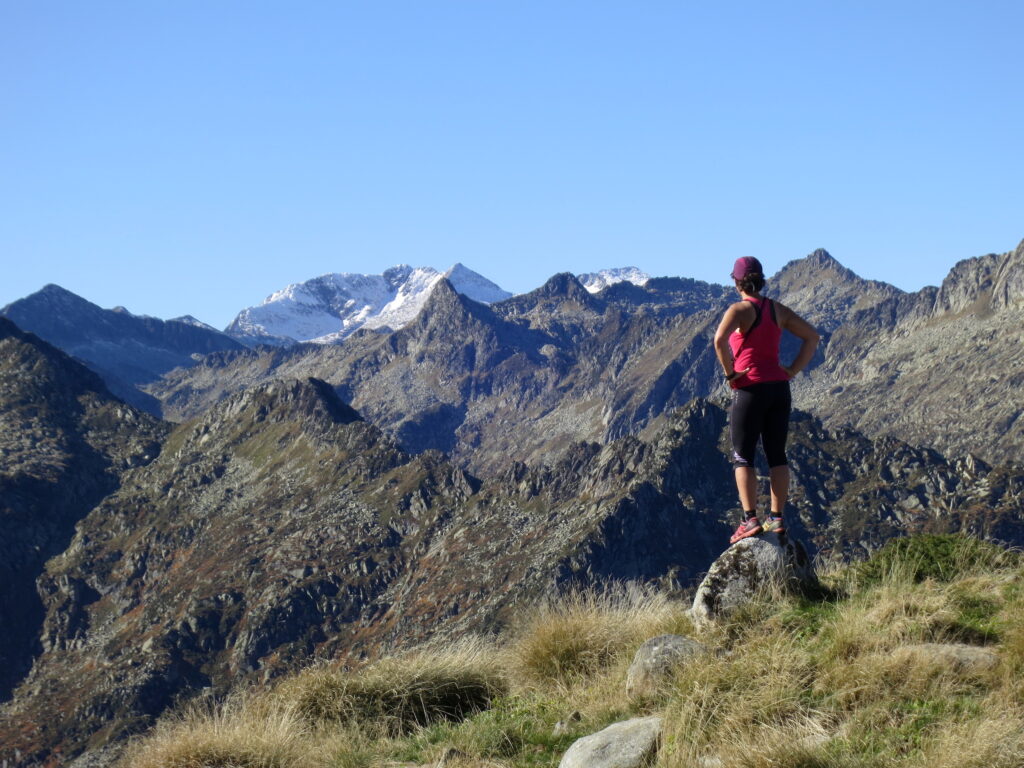
Hiking. Photo: © Penny Walker
Penny Oh, totally, absolutely, yes. I mean, the holidays are totally tailor made. You can choose which activities you wish to do and we will then put everything in place to to create a tailor-made itinerary for you. So we make all the bookings with the activity providers. We make restaurant reservations at our favourite local restaurants where you’ll eat local food prepared with seasonal local produce. You’ll basically just need to turn up, we will present you with your itinerary, talk you through where you need to go, who you’re going to be meeting, and you can just relax and have fun and enjoy the Pyrenees.
Peter And what kind of accommodation?
Penny The full range. Everything from chalets on campsite through to some lovely little bed and breakfasts that we work with. The ones that provide evening meals are my absolute favourite because again, you can enjoy the local produce prepared in-house by somebody who’s passionate about the area.
We’ve also got a couple of fantastic four-star hotels that have just opened up in the area, where you can have a bit more luxury, but not sort of the over-the-top luxury where you feel a bit awkward. It’s all very relaxed. It’s very welcoming and very, very warm. The four-star hotels here are not your traditional four-star hotels.,I think it’s fair to say.
Peter Well, it sounds like my kind of holiday. Can I bring my dogs with me?
Penny Absolutely. Yes, please do. I’d love to meet your dogs. And the beauty is you can drive down as well, Peter. You can take the car; we can arrange a stopover en route for you. So bring the dog, come and let him loose or her loose in the mountains and enjoy a bit of time. Absolutely.
Peter I can’t wait.
Felice So where do you see yourself in the next few years? Will you be expanding into other areas or just keeping doing the same thing?
Penny Oh, definitely expanding, most definitely. We’re currently exploring options. Much more on the Spanish side of the Pyrenees. We have some excellent contacts that we’re cultivating over on the Spanish side, to offer people the best of both the French and the Spanish Pyrenees experience.
The river rafting in particular on the Spanish side is truly incredible. And the river canyoning as well is an experience like no other. Coming down a massive limestone gorge with these dramatic sides, steep sides, in summer is just the most incredible experience. So, yes, hoping to expand on both Spanish and French sides and also further east and west along the chain as well.
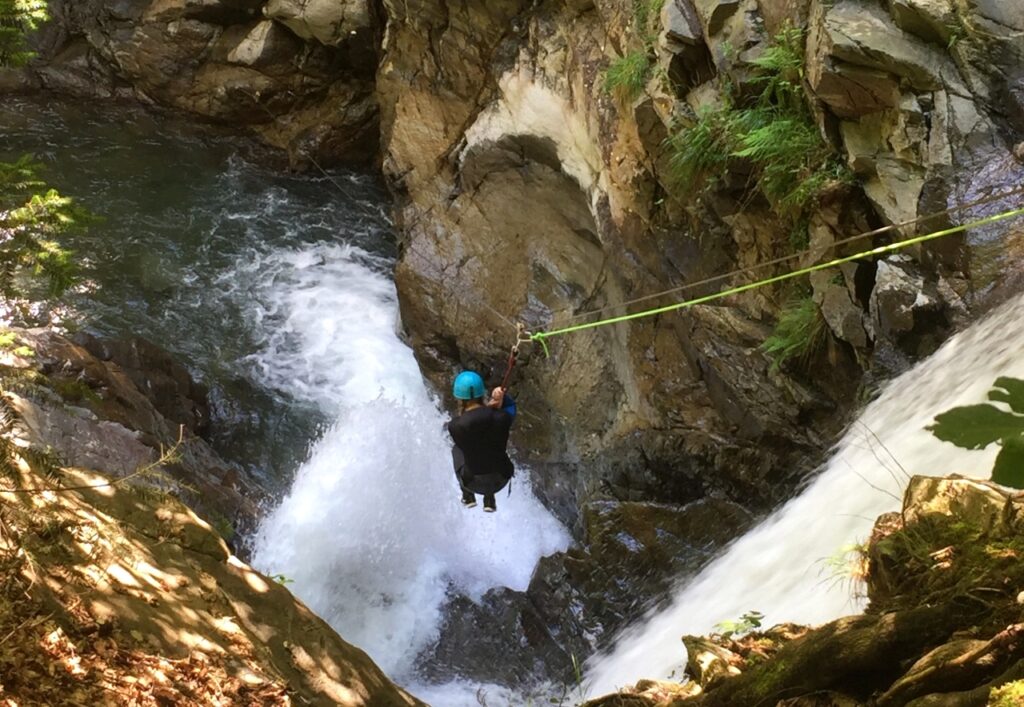
Tyrolean waterfall canyoning. Photo: © Penny Walker
Felice And can you just explain quickly for people that don’t know, what is river canyoning?
Penny River canyoning is an experience in which you descend a river gorge that in the summer is filled with water running down from the high mountains. You’re with a guide, you don’t need a rope, you have a wetsuit on. You jump from ledges into these deep pools of water, clear, cool mountain water. You can take a Tyrolean down a waterfall, landing in a pool of water at the bottom, you can slide on your bum down these rock slides into deep pools of water. Kids love it, they absolutely love it. And we have canyoning for every ability as well – for novice beginners right through to the more adrenaline-seeking teenager who’s after a thrill.
Felice Can you also go river rafting in the mountains?
Penny The river rafting in the Pyrenees is really exceptional, thanks to some hydro-electric facilities that we have up river on the Garonne. They have these water releases in the summer, where they let the water go from the reservoirs further up the Aran Valley, which swells the levels further down and creates these most incredible rapids. This is even in August when you’d expect river levels to be really low. So it’s the grade four, I think even up to grade five, rapids sometimes…just a fantastic environment for your water adrenaline junkie who’s looking for an experience that you won’t get in many other places in August, it has to be said.
Peter And then via ferrata and climbing?
Penny Yes, via ferrata. We’ve got a couple of excellent via ferrata courses here as well. And they’re a great option for people who want to really challenge their head. There’s one just across the border in Spain, which is my absolute favourite, where you’ve got a great mix of the metal rungs going up the rock face, the little wire monkey bridges.
And again, it’s in a really kind of out-there environment where you’re surrounded by the mountains – if you dare to turn your head for two minutes and actually look at what’s around you, rather than concentrating on going up a rope ladder. It’s a beautiful environment and it’s a great challenge not just for kids, but for adults as well. It can be can play a real mental game with your head. But I love it.
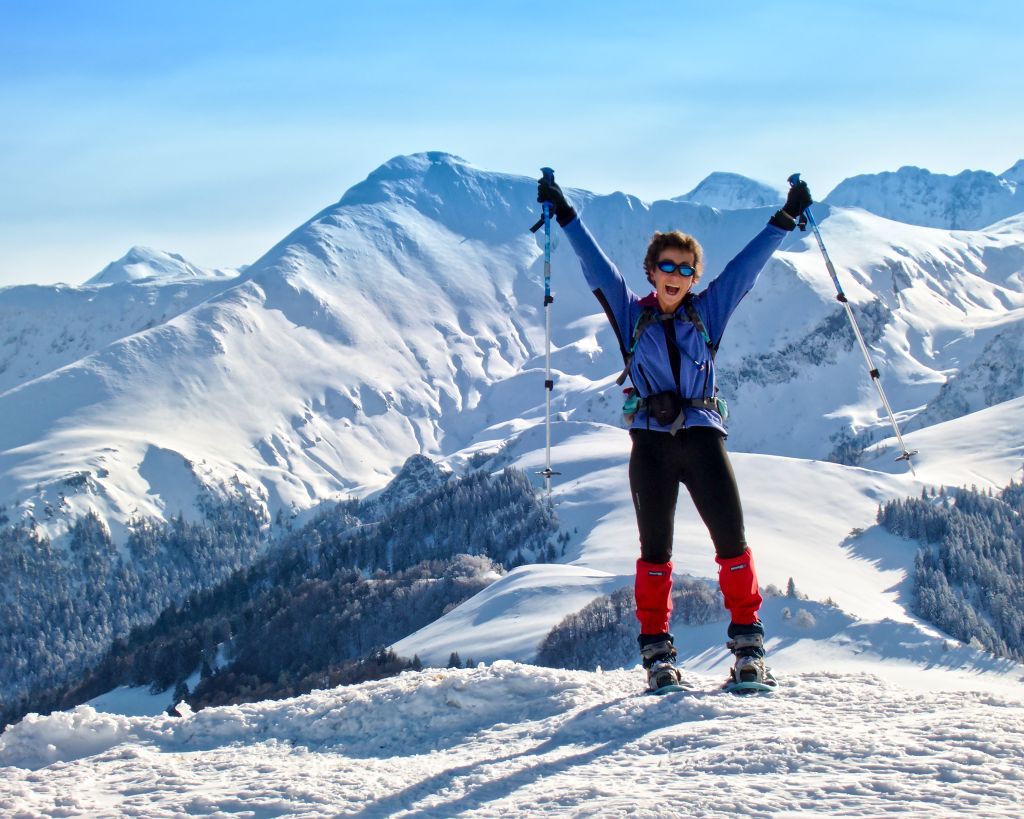
Penny snowshoeing in the Pyrenees
Felice So if people want to book with you, do you have a website?
Penny Yes, we do indeed. It’s www.adventurecreators.com is the website, where you’ll find all the adventures that we’re currently offering. But also we do a lot of tailor-made that is maybe not on the website. So if people have something particular in mind that they’re wanting to do on holiday, we can create a tailor-made trip for them and make arrangements with all the activity providers. We can arrange any length of horse riding up in the mountains, any length of cycling tours, self-guided or guided, the options are numerous. So, yes, please do get in contact with us if you’re looking for some fresh mountain air, a bit of exercise.
Felice And do you feel more French now than British? Do you think you’d ever go back to Britain to live there?
Penny To be honest, no. I have to be honest, I feel totally French here in the Pyrenees. It’s a really deep feeling, but that may be that a lot of it stems from my ancestry where it can be traced back to the French in the 10th or 11th century, I believe. One of my relatives did one of these historical analysis of the family line. So I do have French blood in me now, albeit a little bit diluted, but definitely I feel more French. I absolutely love the language, I love the people, I love the culture, the gastronomy. No, I can never go back to the UK.
Peter Well, right now, the idea of an action packed holiday in the Pyrenees sounds like a dream. Penny, many thanks for coming on the show and we wish you and adventurecreators.com the very best of luck in the future.
Penny It’s been an absolute pleasure to talk to you both. And thank you so much for the opportunity to tell people more about the Pyrenees.
Felice That’s all for now. If you’ve enjoyed the show, please share this episode with at least one other person! Do also subscribe on Spotify, i-Tunes or any of the many podcast providers – where you can give us a rating. You can subscribe on Spotify, Apple Podcasts or any of the many podcast platforms. You can also find us on Twitter, Facebook and Instagram. We’d love you to sign up for our regular emails to [email protected].
© ActionPacked Travel

- Join over a hundred thousand podcasters already using Buzzsprout to get their message out to the world.
- Following the link lets Buzzsprout know we sent you, gets you a $20 Amazon gift card if you sign up for a paid plan, and helps support our show.
